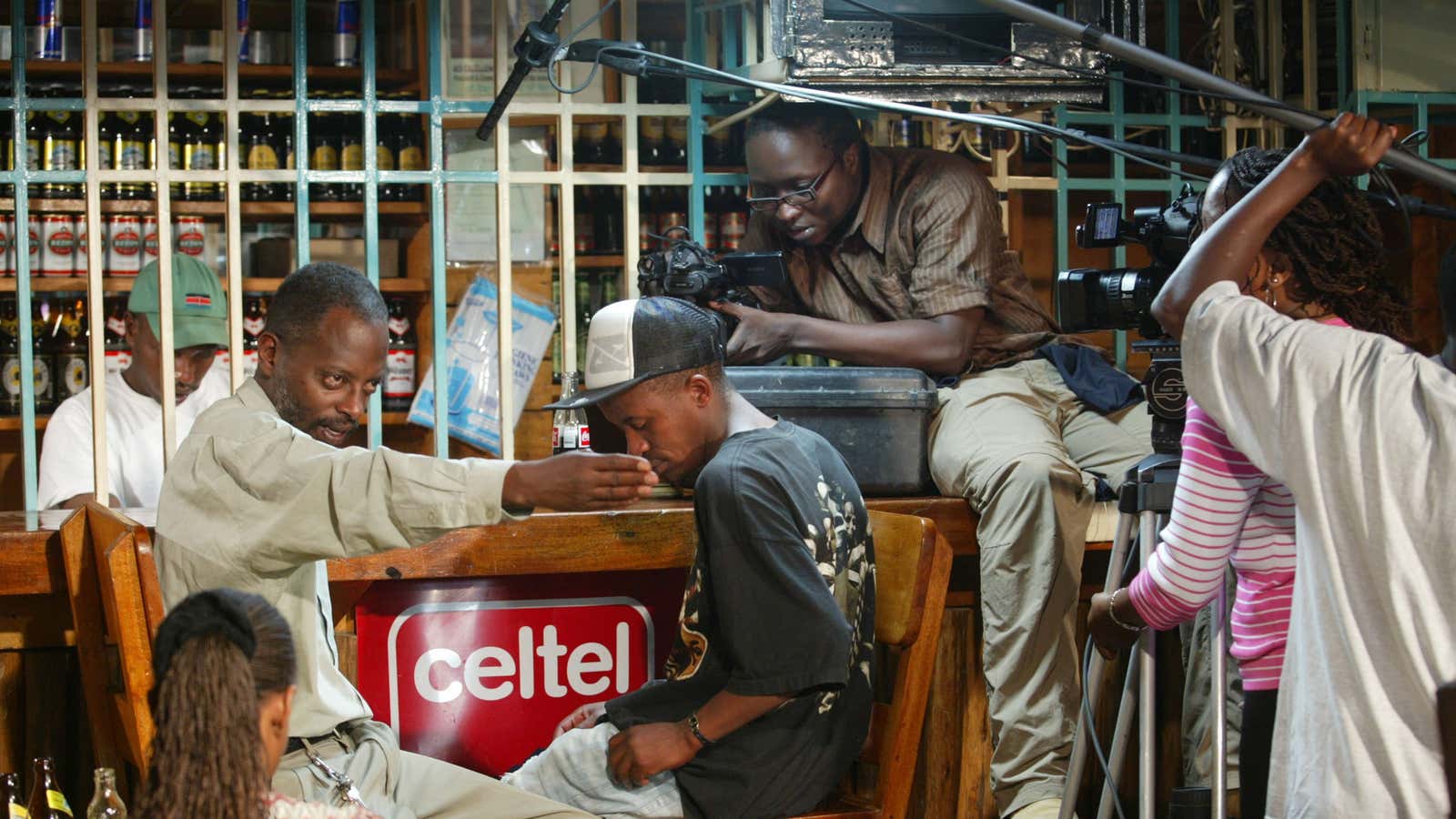In an evening in 1952, princess Elizabeth of the United Kingdom went up the Treetops Hotel near Nyeri town in Kenya’s central highlands with her husband Philip. The hotel was built on top of trees and near a waterhole to give guests a view of the congregating wildlife from relative safety. The next morning, when the 25-year-old princess descended, she was told that her father, King George VI, had died—effectively making her queen.
When the opportunity came to depict this historic moment in Netflix’s grand saga about British royals The Crown, it was shot not in Nyeri or Kenya but more than 5,000 miles away in Cape Town, South Africa. Kenyan filmmakers jumped on this, lamenting the state of filmmaking in Kenya and criticizing the government for failing to lure in big budget productions from Hollywood and beyond.
Eugene Mbugua, an award-winning television producer, wrote a column, noting the licensing and taxation required of filmmakers before shooting in Kenya was so prohibitive “so much so that it’s cheaper to build a mini Kenya in another country for a movie scene.” His views were contested by the film board who said there was “no evidence” producers either wanted to come to Kenya and if they were ever denied a license.
Kenya has a nascent but vibrant film industry and has for decades been an important location for filmmaking. From the Oscar-winning Out of Africa to The Constant Gardener, the BBC’s Big Cat Diary and Netflix’s Sense 8, the country’s beaches, bustling capital, an abundance of wildlife, and landscape diversity have attracted producers. On the local level, directors have produced globally-recognized feature-length films like Nairobi Half Life and Kati Kati, short films like We Need Prayers, and crime thriller series like Tuko Macho.
And as the 90th Academy Awards ceremony gets underway today (March 4), Watu Wote: All Of Us, a movie about a true story of terrorism in Kenya is nominated at the Live Action Short Film category— giving the relatively young film industry a boost on the global stage.
Yet the sector is bedeviled by several problems including infrastructure and skill development, financing, equipment provision, and promotion. This has left Kenya lagging behind its competitors in Nigeria, Morocco, and South Africa, who have used a blend of financial incentives and logistical support to attract international productions like American Sniper, Game of Thrones, Homeland, District 9, and Blood Diamond.
George Gachara, a co-director of the Nairobi-based the Nest Collective, said part of the difficulty in jumpstarting the industry was related to “punitive” regulations. To shoot in Kenya, both local and foreign filmmakers he said are expected to incorporate a company, register as an agent with the film department, acquire a license, submit the script for regulatory appraisal, strictly state the number of days and locations of the shoot, and then pay a daily rate to use them. All this, he said, creates a “hostile” environment that deters many from coming.
“If you think of other professions, the government is heavy-handed and very suspicious about film,” Gachara said.

Part of this bureaucracy is the responsibility of the Kenya Film Classification Board, the government agency that regulates all visual content. Its head Ezekiel Mutua is a controversial figure who is known as the country’s censor-in-chief. Mutua once called Netflix a threat to Kenya’s “moral values and national security,” banned cartoons and movies for glorifying homosexuality, forced Coca-Cola to remove a kissing scene from a TV ad because it violated “family values, and introduced draconian law that was eventually scrapped which sought to censor the media and film content.
Instead of focusing on “moral” caveats, industry specialist says the commission should boost creative production by helping create film schools, attracting financiers to open more studios, underwriting projects by upcoming filmmakers, lobbying the government for more rebates for producers, and promoting Kenyan films abroad.
“The industry is very isolated” as it is now, Gachara states, and cannot even adequately support international filmmakers when they come to Kenya.
To transform the movie business, Kenya is considering amending its existing film law, a revised colonial act that stakeholders have said needs improving in its scope, and basing its classification and enforcement powers on the constitution. Amendments to the Copyright Bill are also expected to tackle piracy, allowing filmmakers and artists to receive a fair compensation for their work.
Through the new reforms, Kenya also plans to introduce a highly competitive new tax incentive for foreign producers working in the country. If this happens, it could help boost the country’s cinema revenues, which is expected to reach $7.7 million in 2020, according to PricewaterhouseCoopers.
Telling our stories
Despite all the problems, Mbugua says it is important local filmmakers produce resonating artistic and historic work that will champion the story of Kenya on the global stage.
While cognizant of the need to deepen the country’s place in the global value chain, it is important he said to be aware of the type of stories being told and the conversations they elicit about Kenya as a nation. Part of that interest in filmmaking should be encouraged in schools—something that Kenya’s new curriculum is already considering by introducing classes in visual arts and performing arts.
“Our story is very unique because of the role we play in the continent and the role we play in the world’s history,” he said, drawing on the example of The Crown. “But it is unexploited. And that’s a downside.”
